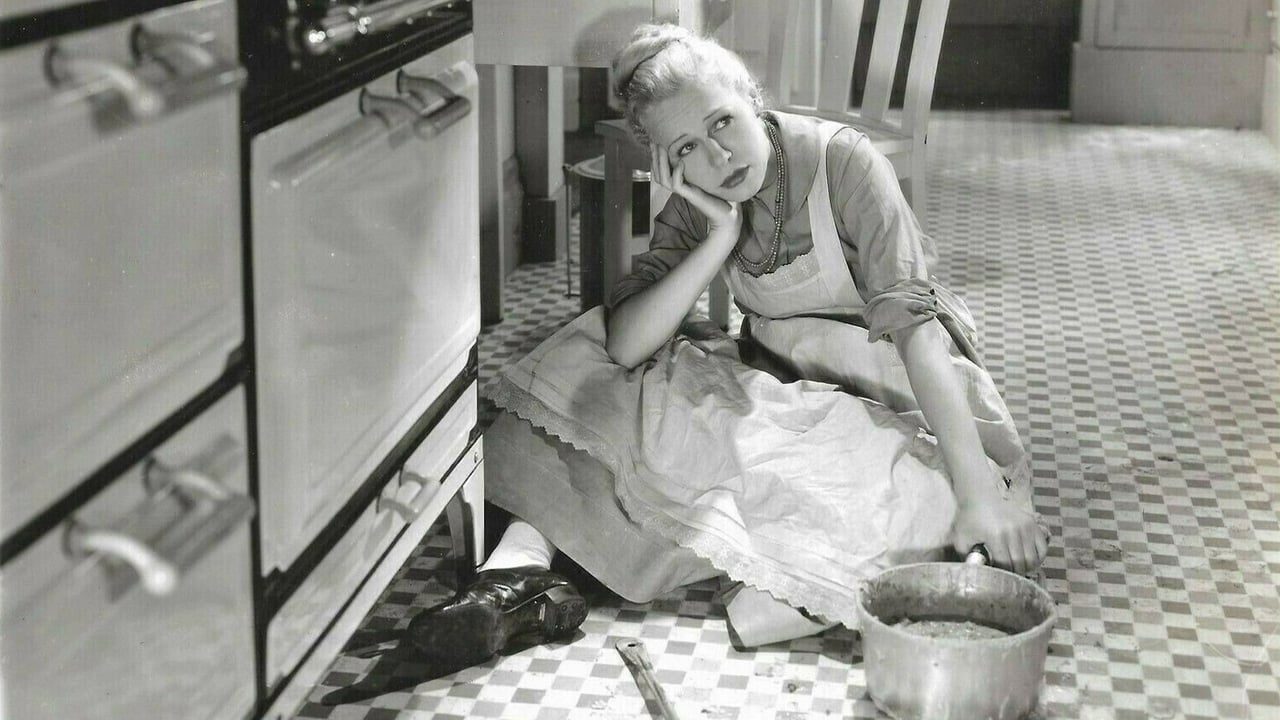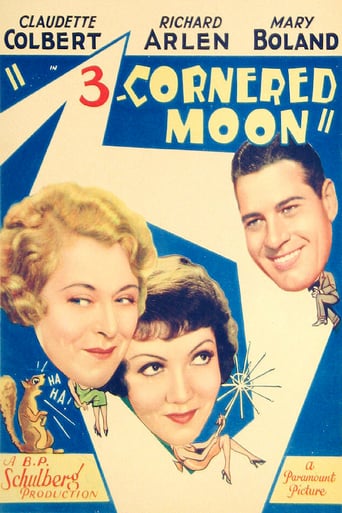

Very well executed
... View MoreIt's funny watching the elements come together in this complicated scam. On one hand, the set-up isn't quite as complex as it seems, but there's an easy sense of fun in every exchange.
... View MoreExactly the movie you think it is, but not the movie you want it to be.
... View MoreBy the time the dramatic fireworks start popping off, each one feels earned.
... View MoreGot this 1933 movie from the library. Colbert is charming as are the rest of her family members. She was not yet a STAR, but her star quality is on display. It's frequently a laugh out loud movie. The story line of a daffy matriarch, Mary Boland, who gets wiped out by the stock market crash of 1929 and her 4 adult children who are still living at home, and what they do to survive the crisis makes for a delightful hour or so. The maid/cook whose English is minimal does not add anything to the comedy, but this is a minor fault. I've never previously seen Richard Arlen, who stands on the sidelines, quietly loving Colbert, and was glad to see how at the ending one obviously wrong suitor was replaced for another.
... View MoreThis film is charming largely because of the lead Claudette Colbert, whose elfin presence makes it all come alive. The film itself never wholly overcomes its origins as a play by Gertrude Tonkonogy (died 1989) written for the stage rather than the screen, her play of the same title having opened in March of 1933 and been released in this film version within four months of that. Clearly the producers were looking urgently for a 'feel good' story which drew comfort from a cheerful survival of the hard times. The story features an eccentric family, the father of which is dead, named Rimpelgar, Colbert being the only daughter. The Rimpelgars live in a huge rambling house in Brooklyn, that part of New York which is not Manhattan and is on the wrong side of the river, and which in their day, the 1930s, was a fine place to live. (Today, that can only be said of patches of Brooklyn, though there is an ongoing struggle to make it regain its dignity.) They do not have Brooklyn accents because they are rich people, or were before the father died. Now the dotty mother (played by Mary Boland) has lost everything through being, well, an idiot, and letting a scoundrel take it all and invest it in a worthless phoney mine called Three-Cornered Moon. (This must have been clearer in the play, because in the film the reason for the title is pretty obscure and mentioned only in passing.) So they are all suddenly thrown out of non-work into hard work, the daughter and her three brothers. The eldest brother is played by Wallace Ford, and what a surprise it is to see him as he was before he became the grizzled elderly character actor that he played in so many films decades later. Yes, the times are hard, as it is the Depression. There are many times when they all have nothing to eat and sit at a grand dining table with only a little bread between them. But they 'smile through', and all ends happily, despite a great deal of worry, tension, and stress. There is a side story about Colbert being in love with a self-indulgent would-be writer who is always working on Chapter Fourteen of the great novel which is never finished. She puts up with him for most of the film, to our great disgust, until she finally is freed from her blind love, sees the light, and dumps him. There are a lot of jokes about the Polish maid (Lyda Roberti) who cannot speak English and calls flowers 'George', but although that may all have been funny in the 1930s, it isn't now. The film does not lead to grim fate but smiling through gets them through, and this must have been a tonic for a weary public struggling to emerge from the Depression which was supposed to be over but, like the one now, is not over at all except in theory or because some politician says so. Maybe as things go on getting worse, we can recommend this film to our friends and contemporaries today, and let them remember that in 1932 a great deal of Claudette Colbert and her family 'smiling through' took place, so that we ought to try a little of that ourselves. If we can force the smiles, that is.
... View MoreIn the 1930s, there were a ton of films featuring kooky rich families. In some cases, like "My Man Godfrey" it became a true classic. In the case of films like "Merrily We Live" and "You Can't Take it With You", while not classics, they a were lot of fun. However, "Three-Cornered Moon" while very similar to the other films generally misses the mark and proves that not all kooky family films are made alike.The biggest problem with this film is that unlike most of the other rich kooky families, it's really hard to like this one. The Rimplegars are rich but even more lazy and stupid than the norm for these films. All four of the 'children' (as the mother calls them throughout the film) are adults. Three have college degrees and two of these just sit around all day doing nothing to earn their keep. The youngest goes to school to party and the oldest is under-employed and most concerned with his on-again/off-again relationship with a rich and vacuous bimbo. As for the mother (Mary Bolland), she is a giant brain stem--running the family's fortune into the toilet and ignoring the looming financial crisis. She's not funny--just happy to be stupid. When ultimately they learn that they are broke and need to work to support themselves, the audience is left thinking this is great--and the film is the closest any movie ever got to convincing me communism is a good thing (as these lazy gadabouts would be the first ones shot if such a revolution occurred). Listening to them whine about their fortunes while America was starving during the Depression make this hard to take.It's amazing that Claudette Colbert managed to play perhaps the most unlikable family member--considering she was a wonderful actress and often played such decent people. Through much of the film, she takes care of her good-for-nothing fiancé and makes excuses for his not being willing to work!! So, when she FINALLY decides she's had enough of this guy and wants to marry nice-guy Richard Arlen (a hard-working doctor), you feel like yelling out to him "run away!!"--as you most likely don't want to see him throw his life away on such a loser.Now it's not all 100% terrible. At least some of these spoiled arrested adolescents become responsible and productive by the end of the film. But, by then, the film had lost me because the characters lacked charm, depth or redeeming qualities. Kooky is one thing, lazy and annoying is another! With so many similar films out there like this one but which are good, I say avoid "Three-Cornered Moon". Even if the acting is pretty good, the writing definitely isn't.
... View MoreThis stagy adaptation of the Broadway play tends to drag. If director Nugent and editor Loring had sped things along it might have worked. In spite of such stellar talents as Colbert (in a role originated by Ruth Gordan) and Mary Boland, Three-Cornered Moon is only passable entertainment. The story, about the irresponsible off-spring of a wealthy-widow-now-broke (Boland), has its charm and enough funny moments to make it worthwhile for die-hard Colbert fans. However, it is difficult as to why it was selected to be part of TCM's Claudette Colbert Collection. The rowdy antics of Colbert's on-screen brothers chasing each other around the house border on the ridiculous. Wallace Ford was 35 years-old, William Bakewell 25, but only 20 year-old Tom Brown fits the bill for these kind of shenanigans. And poor Lyda Roberti isn't given much to do -- what a waste. Her part fell flat and should have been re-written for the screen adaptation.
... View More